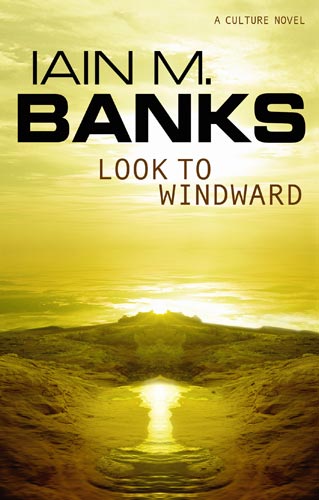Book Review: Iain M. Banks’ “Look to Windward”
by Miles Raymer
The Culture universe is an undeniably brilliant creation, containing more than one writer’s fair share of imaginative inventions and astonishing moments. I have been impressed with every Culture novel I’ve read, but often complete them wondering what Banks could have done to warm my heart the same way he enchants my brain. After this refreshing and haunting experience, however, I can confidently say that is no longer the case. Look to Windward is easily my favorite of the series so far, though fortunately I still have a good number left on the shelf.
Look to Windward’s central conflict involves a race of five-legged cat-like aliens with similar-to-human intelligence called Chelgrians. Chelgrians are a space-faring species with considerably less advanced technology than the Culture. They are considered backward by Culture standards due to their adherence to an anachronistic caste system and bellicose proclivities. In the wake of a brief but vicious civil war, Chelgrian societal tensions become personified by Ziller and Quilan, two idealists with radically different worldviews. Ziller is a brilliant composer and political dissident who renounces his Chelgrian heritage and defects to become a citizen of the Culture, and Quilan is a heartbroken war veteran bent on revenge after the Chelgrians learn that their civil war was partially the result of Culture intervention.
This story is a sad, ponderous one. It contains very little action, and generally alternates between descriptions of intergalactic natural phenomena and contemplative conversations between its main characters. Though Ziller and Quilan’s lives are intimately connected, they never actually meet face to face. Instead, their journeys are mediated by a host of lively, thoughtful characters, the most memorable of which is the Masaq’ Hub’s avatar––the physical manifestation of an ancient Mind that was once responsible for mass murder.
Look to Windward, though draped in the disarming guise of Banks’ playful writing, explores some of literature’s most difficult themes: revenge, loss, regret, foreign intervention, social isolation, and redemption. Ziller and Quilan are both obstinate but likable in their own ways, and Banks portrays their respective personal struggles with comparable compassion––even if he agrees philosophically and morally with one more than the other. Like any ethically complex narrative, Look to Windward assumes the premise that understanding the nature of ethical problems by examining the internal perspectives of all involved parties is the only way to expose and address the root causes of sentient suffering.
In a grand sense, Banks’ project here is to explicate the Culture’s ethos by observing it through the lens of a lesser alien civilization. Ziller is particularly incisive in his critiques of the opulent society for which he has forsaken his own. As always, the Culture is benevolent and utopian until it’s not, at which point catastrophic events often ensue. Still, those events rarely impact the Culture’s pampered citizens, who blissfully follow their individual post-scarcity whims wherever they might lead, leaving superintelligent machines and top secret organizations to clean up the intergalactic mess. The connection to modern first world countries is obvious but not overly heavy-handed.
The most significant difference between today’s problems and those of the Culture is the presence of Minds––superintelligent machines who, as a kind of compassionate homage to their biological predecessors, protect and provide for their human constituents. The Masaq’ Hub Mind is by far my favorite depiction in any of the Culture novels I’ve read thus far. This Hub, a melancholy being haunted by a violent past, is nevertheless determined to protect the lives of more fragile creatures. It is the ultimate lovable machine, and Banks’ descriptions of its emotional density, subjective experience of time, and intellectual capabilities are breathtaking. It speaks to Banks’ great talent that, in the final analysis, the character with whom I identify the most is the least “human.”
I wouldn’t try to argue that Look to Windward is objectively the best Culture novel, but it certainly is the one of which I have become most fond. The book left me in a state of melancholy hopefulness, enraptured by the experience of a deeply affecting tale but saddened by my knowledge that the only experience I’ll ever have of a Culture-like society will occur inside my own imagination. We should all have someone “looking to windward” with our best interests at heart, and we should all seek to do so for others. Though the author himself is no longer with us, this story stands as a special reminder of Banks’ ability to bring us back to such commonplace but crucial conclusions.
Rating: 10/10
